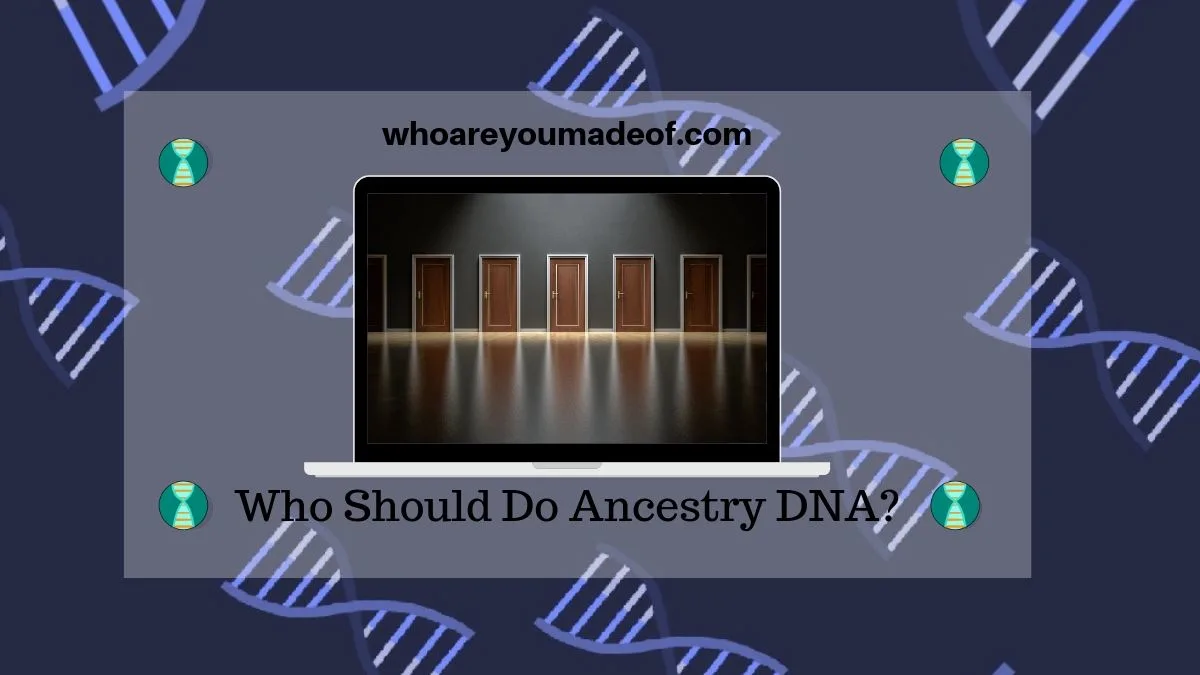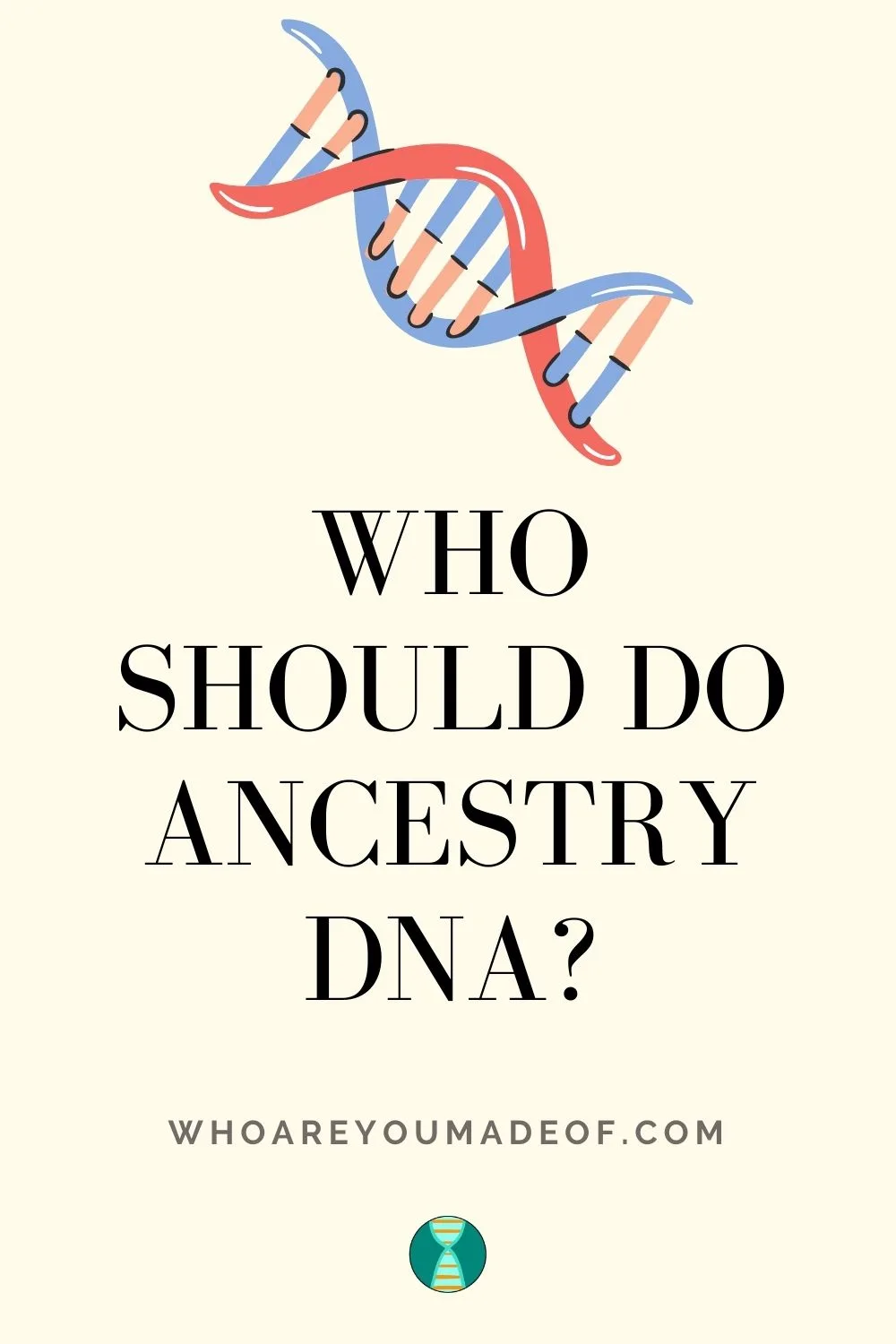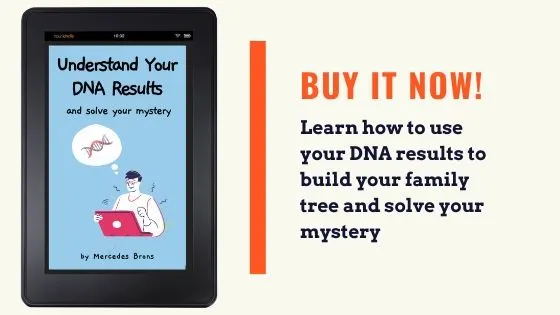Are you considering taking an Ancestry DNA test, or gifting one to a relative? If you want to know who should do an Ancestry DNA test, and which family members can help you learn something new about your family tree, you will find this post helpful.
The Ancestry DNA test is a great way to learn about the regions of the world where your ancestors lived and find living DNA relatives. Doing Ancestry DNA yourself, and asking relatives to take a DNA test along with you, is the best way to take advantage of all that you can learn from DNA testing.

I receive e-mails on an almost daily basis inquiring about which family member should "do Ancestry DNA". This post should help you work out which relative's DNA results will provide the best insight into your family's ancestral origins.
At the end of this post is a link to the Ancestry DNA site where you can get your DNA test - the best way to start your DNA testing journey!
Should my sibling do an Ancestry DNA test?
If you have already done a DNA test, will you learn new information if your full or half-siblings also do the Ancestry DNA test? The answer is very simple - yes.
There is a lot that your family can learn from multiple siblings taking the Ancestry DNA test, even if one or more siblings have already taken one. This is because of the way that DNA is inherited and passed down from generation to generation.
The Ancestry DNA test examines our "autosomal" DNA, which is inherited from both parents. We only inherit 50% of our mother's DNA and 50% of our father's DNA, however.
Even more interesting is that while our full siblings also inherit 50% of each of our parent's DNA, it is not an identical 50% to the 50% that we inherited. In other words, some of the DNA that our siblings inherited from our parents will match ours, and some will be very different.
Contained within the DNA that our siblings inherited that we didn't inherit is valuable information, including DNA regions that didn't show up in our test results. Our siblings will even have pages of more distant DNA matches that we don't have that can help us build our family tree.
The only situation where I would not recommend testing additional siblings is when both parents have also done Ancestry DNA tests.
Should my parent do an Ancestry DNA test?
If your parents are available and willing to do an Ancestry DNA test, then I would highly recommend testing one or both of your parents.
As I mentioned previously, we don't inherit 100% of our parents' DNA. The result of this is that our parents have a substantial amount of DNA that is not represented in our own genome.
The DNA that we inherited from our parents was "chosen" by biological processes in a seemingly random fashion.
One of the most popular reasons to do a DNA test is the "ethnicity estimate" that shows us the region of the world that most closely matches our DNA. The ethnicity estimates of our parents will be different than ours because of the DNA inheritance process.
Should my child do an Ancestry DNA test?
If you have done a DNA test, there is no new information that can be learned about your family's ancestry from your child's DNA results. This is because the DNA information that your child has in their results pertaining to your side of the family was inherited from you.
The best reason for a child (whether an actual child or a grown-up child) to do a DNA test is to learn about the DNA that they inherited from a parent who is not available, or willing, to take a DNA test themselves.
Let's imagine, for example, an imaginary family. Sally and Jeff got married and had a daughter named Meg. When Meg was a small child, Sally and Jeff divorced and Jeff raised Meg without Sally in the picture.
Meg got her dad, Jeff, an Ancestry DNA test for Christmas when she was a junior in college because she knows her dad has always wanted to learn about his family's Native American origins.
When Jeff gets his results, he wondered if Meg should take a DNA test, too. Would her results reveal something that didn't show up in his DNA test?
If Meg decided to take a DNA test, it will not reveal anything new about Jeff's family. Meg can learn about her mother's side of the family, however, from taking this type of a test.
Many parents, including myself, have helped their adult children learn about their other parent's family origins through the Ancestry DNA test.
Should my grandparent do an Ancestry DNA test?
If you are in the fortunate position of having a grandparent available and willing to take an Ancestry DNA test to help you learn about your family, congratulations!
Grandparents, or even great-grandparents, are the most important people on your journey to learn about your family's origins. I say this from a DNA testing perspective, but also from a family heritage perspective.
Don't miss the chance to talk to your grandparents about your family's history. They are an incredible source of information and are usually very glad when their younger descendants take an interest in genealogy.
Back to the topic at hand: You only inherited about 25% of your DNA from any of your four grandparents. This means that 75% of your grandparents' DNA is not represented in your DNA results.
Our grandparent's DNA results reach much further back into history than we can with our own results. If you have a chance to test a willing grandparent, don't pass it up.
Should my aunt or uncle do an Ancestry DNA test?
Your aunts and uncles share 100% of their ancestors with you, and so anything that shows up in their DNA results is relevant to your own journey into DNA testing and family tree building.
Full siblings only share between 33-50% of their DNA with each other, which means that the siblings of your parents have DNA that your parents didn't inherit from your grandparents. Of course, since your parents didn't inherit this particular DNA, they couldn't have passed it down to you.
This is why testing an aunt or an uncle is a great way to learn more about your ancestry when your parent or grandparent is unavailable for testing.
Can I learn something from other relatives taking the Ancestry DNA test?
When parents, grandparents, siblings, aunts, and uncles are not available for DNA testing, are there any options for us to learn more about our family's ancestry?
First cousins, great-aunts and uncles, and even second cousins can do DNA tests to form a more complete snapshot of our family's combined journey through history.
How to get an Ancestry DNA test
You can use the following link to get an Ancestry DNA test for yourself or for your relatives. Testing as many people as possible from within your family, following the guidelines above, will help you learn as much about your family's ancestry as possible.
If you use the link below to get your tests, I might received a small commission (at no extra cost to you, of course!), which helps me support the costs of running this website. I appreciate it very much!

Conclusion
I hope that this post has helped you understand who should take an Ancestry DNA test! Almost everyone can learn something new about their family and ancestry from DNA testing.
If you have any questions about something that you read in this post, I would love to hear from you in the discussion below.
Thanks for stopping by today.

